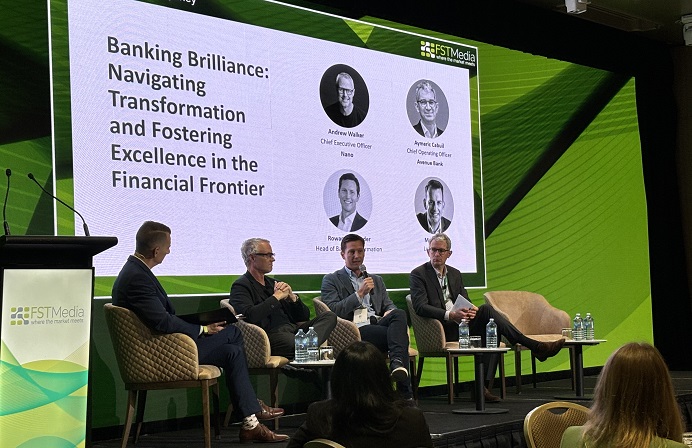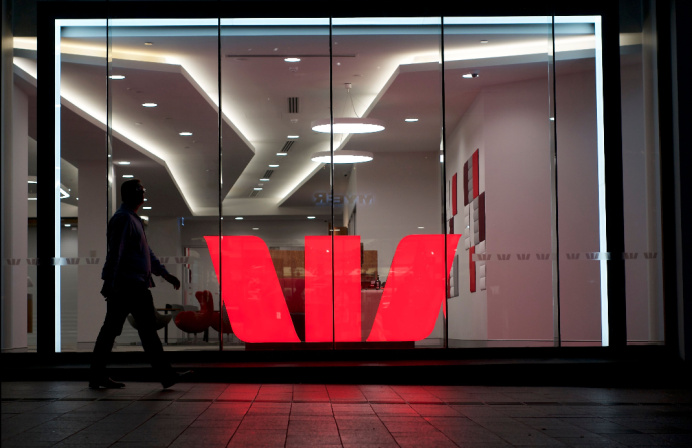
A future of ‘ambient’, branchless and even app-less retail banking is inevitable, according to ex-Westpac Group COO and Nano Platform co-founder and current chief executive Andrew Walker, who predicts that the traditional banking franchise is already on the verge of an existential crisis.
“GPTZero came out a few days ago,” Walker said as part of an FST panel discussion earlier today, hinting at what may prove a milestone inflection point in human history where automated and machine processes begin to dominate business-to-consumer interactions.
“Whilst we’re all here discussing large-scale transformation, taking 20-year-old systems and figuring out what to do with them, at a customer interaction level, we’re already moving to… a world where financial services are almost invariably going to become ‘ambient’,” he said.
Alluding to – at least in philosophy, if not practice – the Amazon Go model (where customers can shop at a physical Amazon store, and walk out with their selected goods in their basket, automatically paid for, without encountering a checkout barrier), Walker argued that banking services will inevitably evolve to become invisible and unheard background noise in the everyday consumer experience.
“All of the interaction layer of financial services is archaic, outdated and nobody wants it, frankly,” Walker said.
“Who the heck wants a branch? No one! Who wants to call up a call centre? Nobody in their right mind wants to wait 25 minutes to listen to someone who will tell you to wait for another 25 minutes.
“I want to walk into a grocery store, pick up my groceries… and just walk out. I don’t want to stand there and enter payments. [Similarly], I don’t want to go into a bank branch to get ID’d!
With banks currently grappling with core systems transformations programs, the inevitable march of machine processing will, he believes, quickly render many of these efforts moot.
“When you’ve got an intelligent agent increasing with complexity at the logarithmic rate that they are, whilst we figure out how we re-core our franchises, you won’t exist.
“By the time you get through your 10-year transformation [program], your franchise is going to be irrelevant, because there are people moving faster; they’re just going to cut the top off the interaction layer and then plug into the first financial institution that’s discovered, and the only real competitive advantage you’ve got is a balance sheet and an API.
“This is how it’s going to play out. And I’m worried for you guys and worried for me as well!”
How to build the bank of tomorrow from scratch
Towards the end of the panel discussion, Walker also expressed his refreshingly candid take on how– in a purely hypothetical scenario – he would go about building a for-profit bank from the ground-up.
Never shy in expressing an against-the-grain but well-reasoned opinion, Walker laid out his path to building an ‘ambient experience’ bank – and, with few concerns other than shareholder return, how it would succeed.
For this profit-seeking bank of the future, he admitted its target consumer base would be, glaringly, limited.
“I’m narrowing my [demographic] bell curve and looking for my profit spot,” Walker said.
“I’m targeting those young people looking to buy cars, houses, and motorbikes – because that’s where you start to get economic [returns].”
This would exclude the cost-heavy ‘tails’ of vulnerable, less-moneyed customer cohorts, and those who may require more accessible interaction options.
“While important” for a regular banking franchise, Walker conceded, these individuals would not be a focus for this hypothetical enterprise.
Appealing to this limited cohort, Walker said, would require a banking experience that is aggressively ‘frictionless’.
“My hypothesis would be that these customers want an ambient financial services arrangement.
“I would be building something that wasn’t in their way. I wouldn’t be building an app [instructing users] to ‘do this and click that’.
“It’d be all voice-activated, with no branches; it’s all online. It’d be all instantaneous and interactive.”
On the question of capital requirements, Walker finds a tidy bypass: “Why would I go and raise capital for a balance sheet? I wouldn’t bother with a back-end balance sheet; I could just rent one from someone with lots of balance sheet money around.
“I can get the economic rent that comes from banking and share some of that rent with the balance sheet.
“I don’t really need to raise all of that capital… to sit on the bottom of the capital stack. I’d simply ignore that.
“The great punch line of all that is, I don’t have to care about anything else. The person who wants to interact with my organisation in a high-touch, high-cost way, or in a face-to-face way which I think is really important for business banking, I don’t want them to bank with me anyway!
“I want people that are low-cost to serve. That, for me, is a big enough organisation.”





